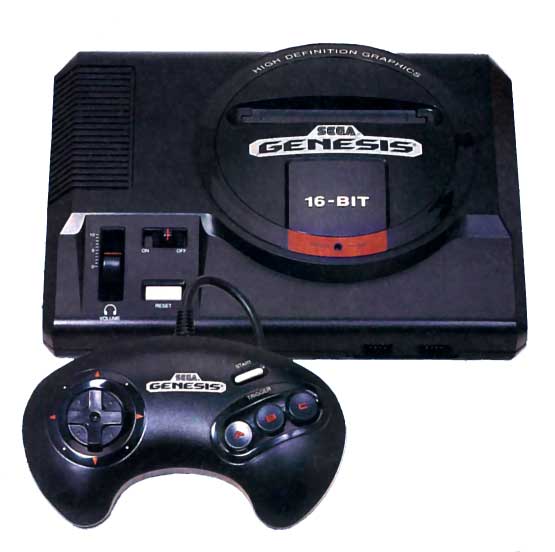In the beginning

If you're in your early thirties, you might have fond memories of playing Sonic the Hedgehog, Altered Beast, or Streets of Rage on a Sega Genesis. After the happy-go-lucky innocence of the NES era, the Genesis introduced millions of Americans to an edgier, more mature gaming aesthetic.
Despite its success in the New World, the Genesis didn't originate in the United States. It started as the Sega Mega Drive, released in Japan 20 years ago. Originally retailing for ¥21,000 (about $163 in 1988 dollars), the Mega Drive inaugurated a brief period of console market domination by Sega, selling 30 million units worldwide in its various forms. It significantly influenced the course of console gaming, while also inspiring some of the most odd and interesting moments in video game history.
Five ways the Genesis changed console gaming
It started the 16-bit era
In the 1980s, 8-bit microprocessors reigned in most video game consoles—partly due to their low cost and partly due to familiarity. 16-bit CPUs had been around since the 1970s, but they remained prohibitively expensive for low-cost consumer products until the late 1980s, when they steadily decreased in price. This new breed of processors gave companies a great chance to one-up the competition through improvement and innovation. Sega did exactly that when it designed a new console, the Mega Drive, based on its powerful 16-bit arcade hardware.
With the release of the Mega Drive, Sega inaugurated a new technological era in the game console arms race. (It should be noted that NEC claimed its TurboGrafx-16 console was a 16-bit system, but in truth, it possessed an 8-bit CPU.) At the heart of this new console lay a Motorola 68000 CPU—the same processor that powered the Apple Macintosh, Commodore Amiga, and Atari ST personal computers. Running at 7.67MHz, the Mega Drive processor blew the Super NES's 3.58MHz CPU out of the water in terms of raw speed and processing power.
Had the Genesis not come along, Nintendo would have been perfectly happy to continue squeezing every ounce (and dollar) out of its aging 8-bit Nintendo Entertainment System (NES) hardware as long as it possibly could. But after the Genesis shipped, there was no looking back; technology had moved on, and the market moved with it.
It knocked Nintendo out of complacency
 Flush with the overwhelming success of the NES, Nintendo was as arrogant as they came during the turn of the 1990s. After thoroughly trouncing the Sega Master System (Sega's 8-bit console) in the United States, Nintendo didn't consider Sega's new 16-bit machine a threat, providing the perfect window for Sega to slip in right under Nintendo's nose. By the time Nintendo snapped out of its heady daze, Sega owned 55 percent of the 16-bit marketplace. Nintendo did eventually wake up, however; through intensified marketing efforts with its Super NES console (originally released in 1991), Nintendo ultimately pulled ahead in total sales, just as the 16-bit era was ending.
Flush with the overwhelming success of the NES, Nintendo was as arrogant as they came during the turn of the 1990s. After thoroughly trouncing the Sega Master System (Sega's 8-bit console) in the United States, Nintendo didn't consider Sega's new 16-bit machine a threat, providing the perfect window for Sega to slip in right under Nintendo's nose. By the time Nintendo snapped out of its heady daze, Sega owned 55 percent of the 16-bit marketplace. Nintendo did eventually wake up, however; through intensified marketing efforts with its Super NES console (originally released in 1991), Nintendo ultimately pulled ahead in total sales, just as the 16-bit era was ending.
It gave us Sonic the Hedgehog
 After the incredible success that was Super Mario Bros. worldwide, Nintendo solidified its corporate identity behind Mario, a pudgy plumber in blue overalls. The image of Mario in the minds of America's youth was strong; in some surveys, more children could identify Mario than Mickey Mouse.
After the incredible success that was Super Mario Bros. worldwide, Nintendo solidified its corporate identity behind Mario, a pudgy plumber in blue overalls. The image of Mario in the minds of America's youth was strong; in some surveys, more children could identify Mario than Mickey Mouse.
Sega soon realized that it needed a mascot as well. Its answer came in the form of a blue anthropomorphic hedgehog capable of running at incredible speeds. Sonic the Hedgehog burst onto the scene in his self-titled 1991 debut, selling millions of copies and stunning the industry. Sonic was cool, fast, and edgy compared to Nintendo's plodding plumber, and he soon wedged his way into the minds of American youth on equal terms with Mario. Sonic the Hedgehog became the Genesis's first "killer app"—that one game that drove Genesis system sales to new heights and fueled Sega's domination of the market. Without Sonic, it's possible that the Genesis would have floundered and ultimately withered under the massive inertial might of Nintendo.
reader comments
0